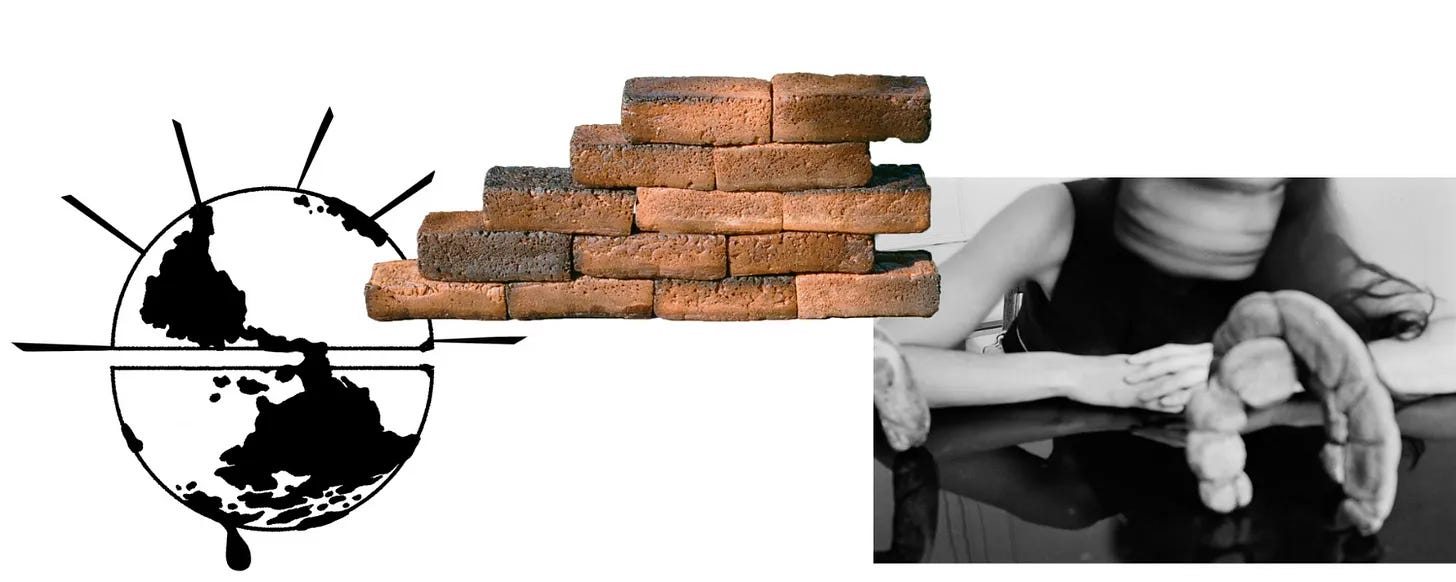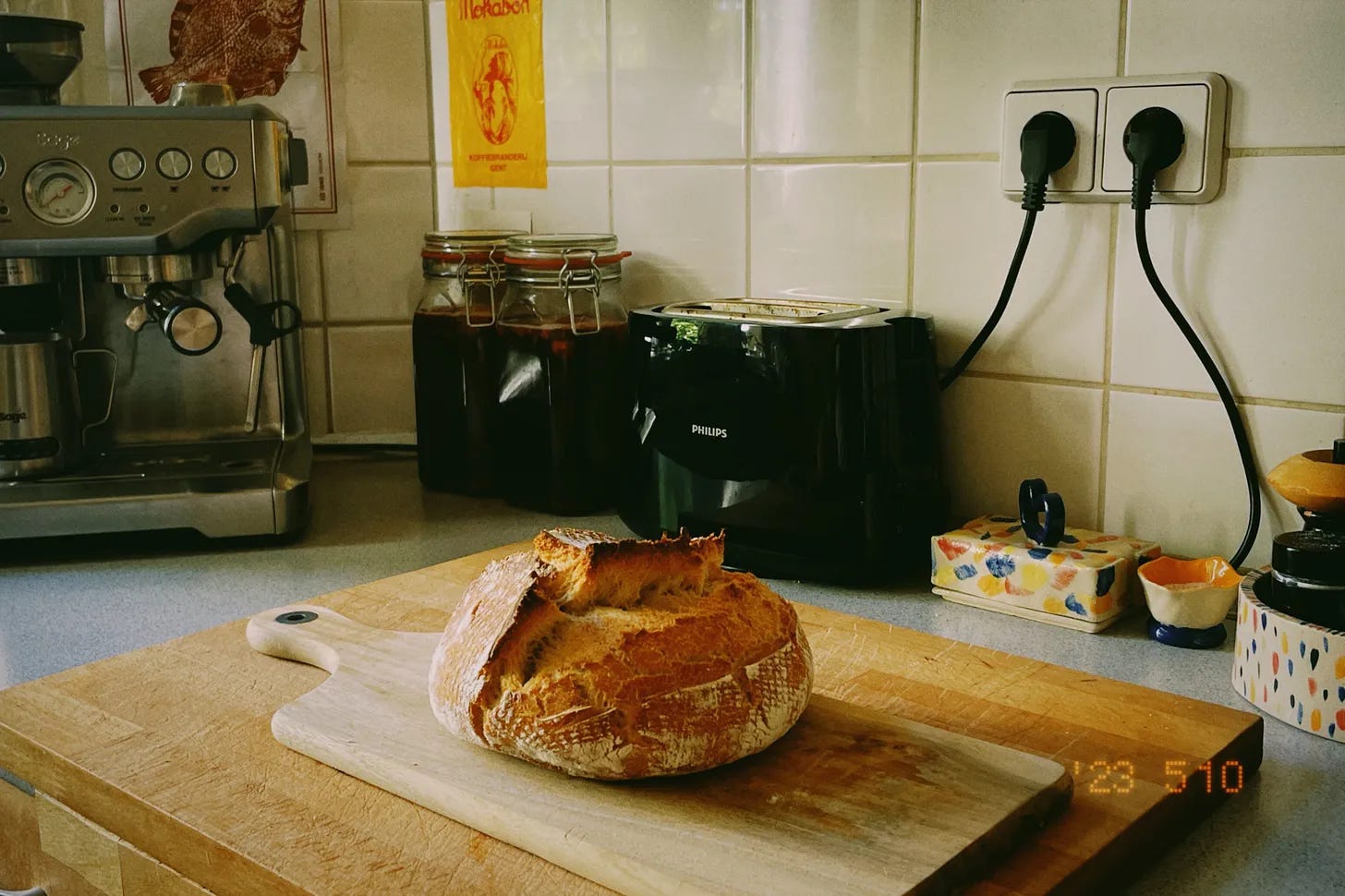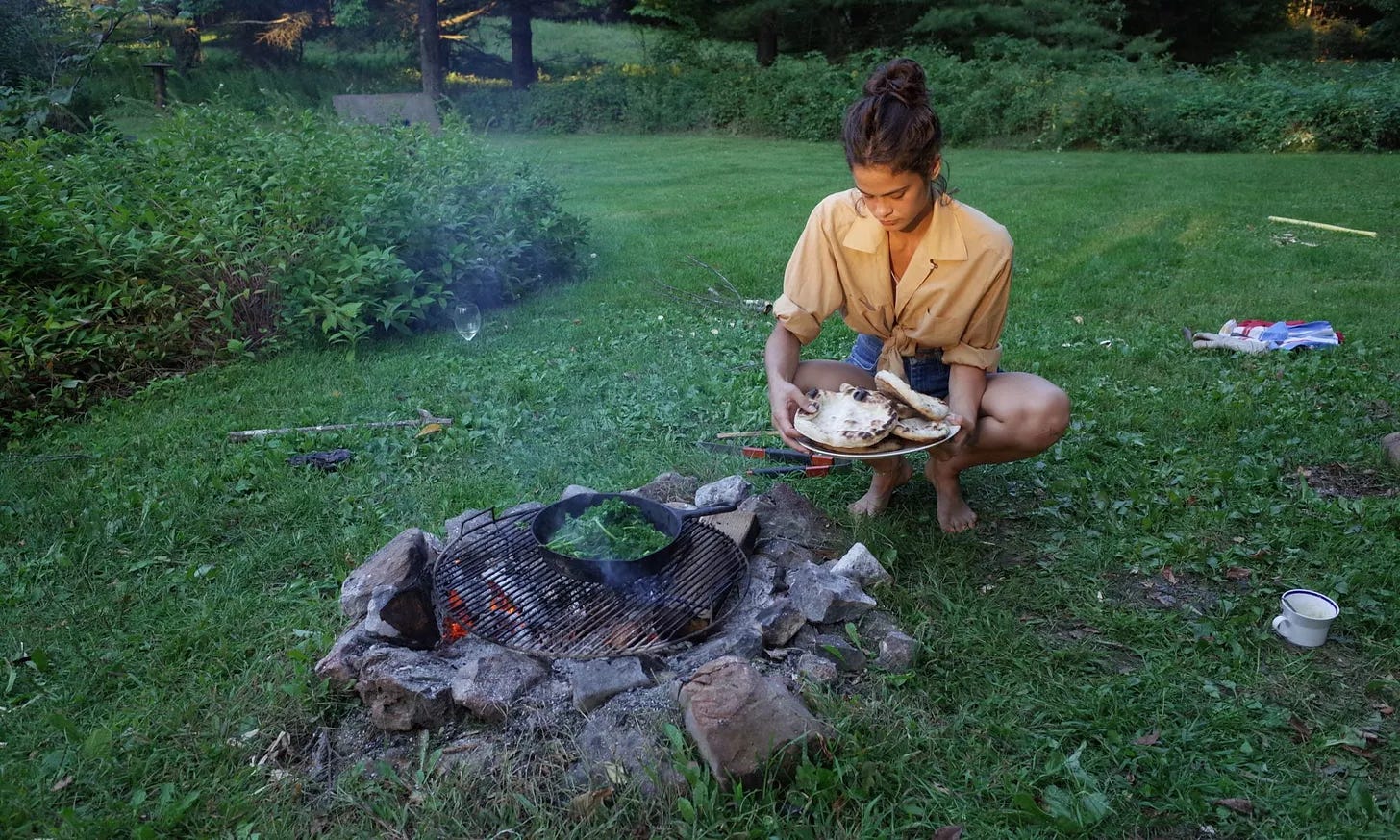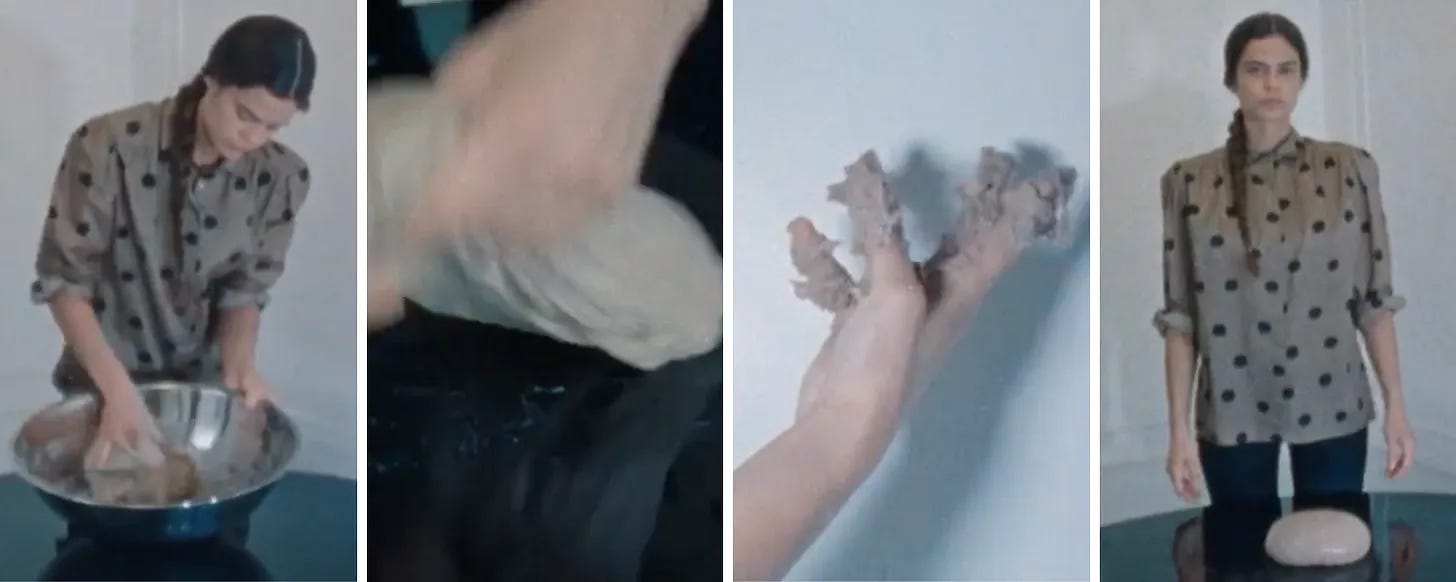Bread, according to its biggest fan
An interview with Lexie Smith.
During the pandemic’s first March, Lexie Smith posed a question to her roughly 40,000 Instagram followers: Who wants a sourdough starter? More than 1,600 people replied. I was one of them. In the months that followed, Lexie and a small team of volunteers sent bread spores around the world. Mine arrived on a morning in May, 2020, in an envelope from Paris.
The frenzied response was shocking but not inexplicable. For Lexie, a researcher and artist, bread signifies the state of things. “Sourdough starter, an endlessly divisible mixture of billions of yeasts and bacterias working in tandem to fortify and leaven bread, the foodstuff most universally symbolic of comfort and security, was an obvious choice for the freshly unmoored,” she wrote in an article for the wonderfully named Mold magazine.
I was among the unmoored. But, when it came to baking, I was also sort of an ass. Making bread was simply the latest in a long line of lockdown delusions I rushed to inhabit. Hydration, humidity, ash content—what was this strange, non-linear math? I didn’t care to figure it out, and it showed. Most of my loaves achieved a level of consistency notable only for their badness. After a few weeks, I let my starter die and became an ass about something else—succulents, if I recall correctly.
As it was with Frida Kahlo and paint, so it is with Lexie and bread. There is a much deeper scope at work. “I have long understood the appeal of my more visually captivating breads as a kind of ruse to get people in the door and then blindside them with conversations about things that are far less palatable,” Lexie has said. We all know bread comes from flour and flour comes from grains. But to what end, at what cost, and at whose expense?
Through her research project, Bread on Earth, Lexie explores bread’s potential as a social, political, economic, and ecological barometer. Currently, much of the fieldwork takes place on a farm in upstate New York. Online, she publishes a “bread web” of books, films, podcasts, hand-written recipes, and political literature, as well as a directory of bakeries, flours, and mills specializing in non-evil grains. There are also some of the most enchanting breads you’ll ever see.
In the first months of the pandemic, Lexie gave so many interviews, was so abundantly profiled, and became so inscribed as a sourdough sage that to revisit her project now might seem chronologically misplaced. But I don’t think time should dictate the stories we tell and it was on a grim day this past spring that I opened my fridge and re-discovered the envelope from Paris. It contained enough dried starter to rehydrate and bake with, as well as a note. On it, there was a URL and an email address, along with the directive to holler with any questions. The link had expired, so I did that, I hollered, I wrote “is it you i’m looking for?” and waited to see what came back.
Right away I got a lovely response from a woman named Dayna, a masterful baker herself and Lexie’s European correspondent on the project. She was sending starters from Paris, hence why my envelope came from there. “What a treat to know that these starters are still out there, floating around all across the world,” she wrote. She helped me revive the contents of the envelope and sent me the missing instructions. A week later I baked my first sourdough since the early pandemic. It was good and I shared it with friends.
I’ve wanted to talk to Lexie since I started following her in 2017. Now, I finally had a reason.
What’s the most remarkable story that’s come from this project?
LEXIE: This is hard because I think the point of bread, sourdough especially, is that it is so unremarkable. It's existed for as long as recorded history and yet there have been a small handful of non-cookbook books written about it in that whole time. The extraordinary qualities of it are found in its pure mundaneness, and the stories that came from a project that was intent on getting people to make it kind of reflect that.
It's been a couple years now since the project was underway and what has remained in my mind is the pure outpouring of gratitude and intimacy that came from the exchange. Just a bunch of strangers landing in my inbox telling me how little faith they had in the world and how this gesture restored it. To me this was and is still absurd and totally misplaced (with all due respect), but I think of the dialogues as time capsules of the moment that I undertook this project in, along with evidence of the power of the internet to both connect and obscure truth and make myth.
But if I had to answer your question straight up, I actually think the most remarkable thing I heard was a follow up from someone who told me that the first loaves they ever baked were with the sourdough and recipes that I shared and that they'd since quit their job and become a professional baker (they sent some pics – the breads looked really good). Basically, it takes very little time to adjust to our new realities, and sometimes we find that where we ended up on a whim was much better than where we started off with intention.
If you could have imparted something intangible with every packet of dried sourdough, what would it be?
Good question (makes me think that I didn't take nearly as much advantage of the propagandic potential of my circumstance as I could have – but we were all so delicate back then). If I'm feeling nice, it would be simply patience. It's so banal a request that it feels like a copout but I think it is maybe the single most important element of breadmaking and of relationship-making and keeping – with our materials, our people, and ourselves. But also I would have liked to send everyone a link to Burial's album Untrue, because words and feelings melt inside of it and you don't have to explain either.
Did you learn something about breadmaking or the greater world of bread that you didn’t know before? Did someone take your sourdough starter in a direction you could have never imagined?
This sounds naive considering my project is called Bread on Earth and is about exactly that, but I was surprised that breadmaking affected so many people the way it affected me. It gave comfort and sustenance, it felt dubiously important and surprising in its transformative capacity. I was surprised that my hypothesis that breadmaking is a way to know ourselves better was actually born out in the feedback I got from the participants of this project. As for your last question, basically every loaf of sourdough amazes me, still.
Do you have a map of where in the world your starters spawned?
I have an inbox full of pictures and postal codes that I turned into a little tin box. I made an archive last year where I asked for image updates from the sourdough recipients and got a lot of photos of loaves back and categorized them by zip code and country, printed them on archival paper and stuck them in a couple old recipe tins. I believe it reached every continent aside from Antarctica.

Inspiring more than 1600 people to bake bread is pretty incredible. If you could inspire 1600 people to do anything else you want, what would it be?
Be nice to the service professionals in their lives.
You’ve long promoted sourdough as a health food. In the West, we’re increasingly led to consider bread a dietary evil. What’s gong on?
That's a very big question, but for starters, bread in America is different from bread in a lot of other places where it is still a staple of the local diet. Bread is a mirror in that way, and it's telling that ours makes people sick. Most breads in America, especially the industrially produced ones, are made with hybrid grain that's grown on enormous farms, which has been engineered for high yield and high gluten. This makes it easier to both farm and turn into bread on large, "cost efficient" scales. On top of the increased gluten levels and petrochemicals used in many high-volume grain farming operations, the process of fermentation, which makes bread easier on the body and more nutrient-available by pre-digesting the starches, is eschewed for fast rising times in order to maximize production.
Add to this the destructive qualities of industrial roller milling, which heats, smashes to bits, and sifts the grain, and you are left with a product that has little resemblance to what we can find in parts of the globe where bread has remained a part of a domestic experience. I say that last part because we've become so estranged from our bread that we've lost the ability to see it as a part of our own story, and not simply an industrial product. So we let other people make it for us, and we've lost sight of our source. It comes down to malpractice. America is good at separating its citizens from the wells of their own power.
You’ve written, “You ought to prioritize biology and intuition over the edicts issued by us recipe writers.” This is inspiring for those who can’t follow instructions but demoralizing for those who can’t, say, run a vibe check on their sourdough. Any advice on developing a feel for things?
Just keep making bread. Take lots of notes and pictures, compare and contrast. Nail one recipe then change one thing at a time and see how it affects the final loaf. Also –find the deep, dusty message boards of the pre-TikTok internet and read through other people's troubleshooting.
Ultimately, art is about asking questions. What did you want people, many of whom were engaging with bread for the first time, to question?
I'll answer this by telling you what bread has made – and continues to make – me question: where do my implicit and tacit beliefs come from? Do I like them? If I don't, do I have the courage to think differently? If bread can be so rich and reflective and so easily overlooked, what else have I missed?
What inspired you to explore the artistic potential of bread, and what unique qualities does it offer as a medium?
I just couldn't stop making it, and the more familiar I became with the craft the more I saw it as a medium like anything else. So adaptable and surprising and malleable. Why wouldn't I mess with that? It was the only medium I felt entitled to, as someone who was surrounded by artists and creative people in New York City but didn't have a studio or a pedigree or the courage to make work that wouldn't one day get eaten or rot. It disappears – this is the ultimate metamorphic trick. Bread's ephemerality is very comforting for the cowardly and reluctant artist. At the very least you can put butter on it.
Does bread as an artform lend itself well to collaboration? Maybe not with people but rather with esoteric elements...
You said it – it is really a community of biota. Billions of organisms working together to make something that another will consume for survival. It also requires eaters, and turns a traditional 'viewer' into one – a much more interesting position to be in, I think. But I also like making bread because it's often a slow, solitary act, and that's a place I feel very comfortable.
Any advice for finding one’s devotion?
Reading gets me obsessed with things, which then can then spiral into devotion. Writers must be moved to write, which means that their subject is often colored by this emotional impulse. I like to sit inside another perspective and be taken for that ride, won over and convinced. When I'm feeling dried up I'll search specific terms in research databases and scroll through the scholarly articles.
But with bread, I think it really became devotion because over time the relationship became personal, the act of making it became mine. That festered through repetition, writing my own recipes, and through sharing the fruits of making them with others, and then basking in the fulfillment and gratitude that brings. Devotion is easy if it ends up making you feel good about yourself.
What’s something else you really geek out about?
Recently, it's vegetable gardening, Elizabeth Holmes and Theranos, the rabbit holes of postpartum reddit where women unceremoniously drag their husbands, and basketball, intermittently. I always obsess over lexicon (ridiculous), grammar and copyediting, especially the copy printed on products and used in poorly conceived ads, and have obsessed sporadically in the past over spectrograms, field guides, and biochar.
I thought it might be nice to bury a packet of dried sourdough starter and instructions on how to make bread so that, for all the shameful artifacts of our civilization, the next incarnation of our species or aliens or whatever will see that we also achieved some great things. Is that something you’ve also thought about?
I definitely haven't, but I support this vision and have plenty of packets I can lend to the mission.
The name of my newsletter, lol/sos, reflects a prevailing mood among our generation, in which so many things are so awful as to be kind of hilarious. From your writing, I get the sense you might have the same perspective…
Yeah, the spectrum does bend back on itself. What sucks is I find it harder to laugh about the really shitty stuff now that I have a kid. He's made me so earnest as to really go whole hog on hope.










how long is a sourdough starter packet viable?
weeks ? years? refrigerated or buried?